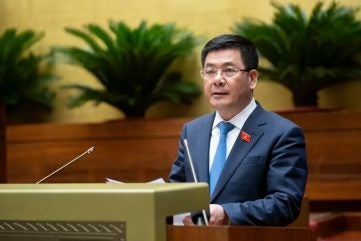
The Vietnamese government has proposed that the state should be the sole investor in nuclear power development according to the draft amended law on electricity presented to the National Assembly by Minister of Industry & Trade Nguyen Hong Dien.
According to the draft, which was drawn up by the Ministry of Industry & Trade, the Prime Minister will regulate special mechanisms on investments, construction and operation of nuclear power plants. This aims to ensure national energy security, in line with Vietnam’s power development plan VIII (PDP VIII), Dien explained. The government believes the state should be the sole investor in such projects as they are important and related to national security, he added.
Nuclear power projects must utilise modern and proven technology to ensure the highest security standards, according to the draft law. Commenting on the draft law, the National Assembly’s Committee on Science, Technology & Environment stated expressed doubts about this, given the Laws on Government Organisation and Promulgation of Legal Documents.
According to Committee Chairman Le Quang Huy there is an opinion that it is necessary to review and clarify regulations on areas where the state is the sole investor. “It’s necessary to create mechanisms to attract investors, as well as to increase feasibility of projects and efficiency of state management,” he noted.
Vietnam currently has no nuclear power project. In September, the Ministry of Industry & Trade was tasked with studying development of nuclear power as a baseload source. The ministry must comprehensively review the sources of energy stipulated in PDP VIII to ensure energy security and annual power supply growth of 12-15%, given economic growth projections of over 7% a year.
Vietnam’s current national power development plan (PDP VIII), approved in May 2023, does not include nuclear power, but Vietnam is considering small modular reactors (SMRs), including floating reactors, with a capacity of 300 MW each. The plan would increase total installed power generation capacity to over 150 GW by 2030 from over 80 GW at the end of 2023. The amendment of the power development plan is aimed at “fully tapping the country’s energy potentials and staying proactive in energy supplies”, Dien said.
In 2009, Vietnam had approved plans to develop its first two NPPs, but the plans were shelved in 2016 after the Fukushima nuclear disaster in Japan and in face of financial difficulties. The plants, with a combined capacity of 4 GWe, were to be built by Russia’s Rosatom and Japan Atomic Power Co in the central province of Ninh Thuan.






